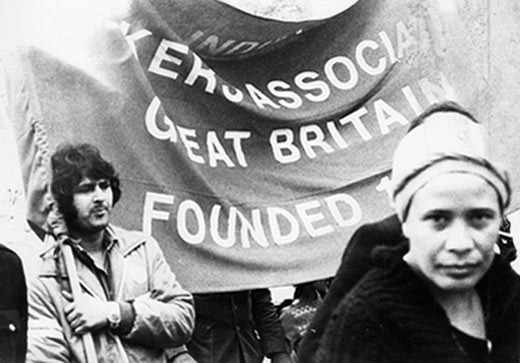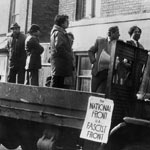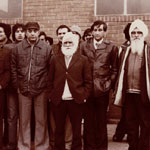
Origins
Standing as one of the oldest minority ethnic organisations in Britain, the Indian Workers' Association (Hindustani Mazdoor Sabha) has been at the forefront of twentieth century anti-racist and working-class struggles. By providing a voice for Indians which demanded to be heard, it has demonstrated the effectiveness of black people in organising themselves to defeat many forms of oppression on a local, national and international level.
Whilst the first Indian Workers' Association was established in Coventry in 1938 to further the cause of Indian independence, it was the arrival of Punjabi migrants during the 1950's that caused the organisation to be reborn and to flourish. As people began to settle, the IWA branches found a new role as they began to turn their attention to the social and welfare issues affecting Indians after migrating to Britain. Branches sprang up where Punjabi populations were concentrated including Wolverhampton and Southall, and in 1958 an Indian Workers Association appeared in Birmingham. Upon advice from Indian president Nehru, the local associations were brought together in 1958 to form the Indian Workers' Association (Great Britain.)
Aims
The bold vision of the centralised organisation was to:
promote co-operation and unity with the Trade Union and Labour Movement in Great Britain
-
fight against all forms of discrimination based on race, colour, creed or sex for equal human rights and social and economic opportunities
-
promote the cause of friendship, peace and freedom of all countries
-
keep its members and the people of Great Britain informed about political, economic and social developments in India
-
undertake social, welfare and cultural activities.
Although still concerned with developments in India, the issues that occupied the Indian Workers Association were broadly to do with social exclusion facing migrants in Britain for example poor housing conditions, racism, employment inequalities, and the restrictions of immigration legislation. Thus, not only did the Indian Workers Association provide a sense of community for migrants in their new country, but it was also firmly committed to the struggles of black and minority ethnic groups and working people.
Membership
The Indian Workers Association was open to all Indians however, the predominance of male migrants during the early days of settlement meant that men dominated the membership and the executive committees. Many were recruited in the factories and foundries of the West Midlands. The spirit of Socialism pervaded the organisation's attitude to its work and a significant number of the leadership either were or had been members of the Communist Party of India. Two key figures in the work of the Indian Workers Association (GB) and the Birmingham branch were Jagmohan Joshi (1936-79) and Avtar Jouhl (1937-.) Joshi, who spent his entire life engaged in revolutionary and campaigning activity, was General Secretary of the IWA (GB) from 1964 until 1979 and was also involved in a number of alliances in which he established links with people like Maurice Ludmer, Roy Sawh and Claudia Jones. Jouhl was active as a union shop-steward in the foundries and served as secretary of the Birmingham branch and General Secretary of the Indian Workers Association (GB) from 1961until 1964. Both men came from the Punjab and were instrumental in leading local and national campaigns.
Activities
A wide range of activities were undertaken by the Indian Workers' Association which focused not only on matters of social justice relating to Indians but also wider ethnic, national and international issues. These activities, which will be explored in more detail in the learning package, centred on social or welfare work, trade union activity, and anti-racist and international solidarity campaigns.
The Archive
The extensive archive of the Indian Workers Association shows how the organisation's unique combination of welfare and campaigning work enabled it to make its mark as a champion of equality for Indians and other exploited groups in Britain and beyond. The collections held at Birmingham City Archives relate to the national organisation IWA (GB) and the local Birmingham branch. Deposits have been made by Shirley Joshi, Jagmohan Joshi's widow, and Avtar Jouhl. Much of the collection consists of correspondence, press cuttings, flyers, campaign material, minutes and reports as well as material from other organisations with links to the IWA. Oral history interviews involving both Joshi and Jouhl, which provide interesting biographical information, can be found in the Charles Parker archive and the Black Oral History Project.
Author: Sarah Dar
Image: Indian Workers Association in demonstration, 1970s
[Birmingham City Archives: MS 2141/Digital Images]
|
|

The IWA
and Anti-Racism

Equality
and Employment

Welfare
and Other Activities
|